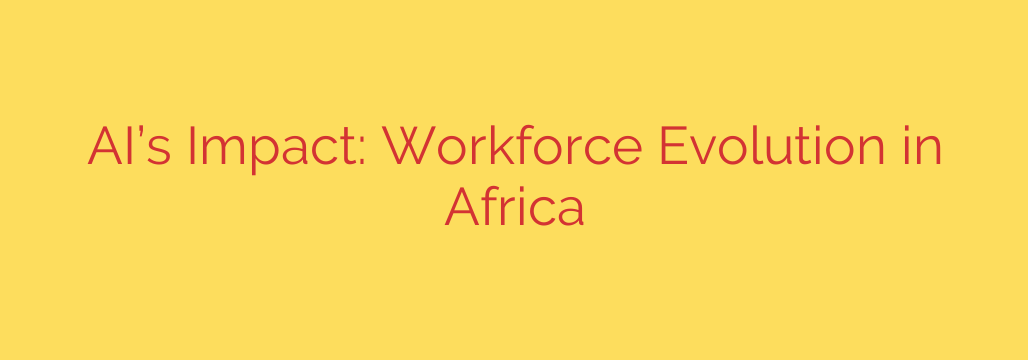
The AI Revolution in Africa: Transforming Jobs and Industries
Artificial Intelligence (AI) is rapidly reshaping economies and workplaces across the globe, and the African continent is at a pivotal moment. Far from being a distant technological trend, AI is presenting both profound challenges and unprecedented opportunities for Africa’s workforce. Understanding this transformation is crucial for navigating the future of work and harnessing technology for inclusive growth.
The conversation around AI often starts with job displacement, and for good reason. Certain roles, particularly those involving routine manual tasks and data processing, are vulnerable to automation. However, the narrative of displacement is only half the story. The real focus should be on workforce evolution, not just workforce replacement.
The New Landscape: Job Creation and Skill Shifts
While some jobs may become obsolete, AI is simultaneously creating entirely new roles and augmenting existing ones. The demand for professionals who can develop, manage, and work alongside AI systems is surging.
Key areas of job growth include:
- Data Scientists and Analysts: Professionals who can interpret large datasets to drive business decisions.
- AI and Machine Learning Engineers: The technical experts who build and maintain AI models.
- AI Ethics and Governance Specialists: Roles focused on ensuring AI is used responsibly and without bias.
- Robotics Technicians: Individuals needed to maintain the automated systems in manufacturing and logistics.
Crucially, AI is also enhancing traditional jobs. Doctors can use AI for faster, more accurate diagnostics, farmers can leverage it for precision agriculture, and financial analysts can use it to detect fraud more effectively. The future belongs to those who can collaborate with intelligent systems.
Key Sectors Being Reshaped by AI in Africa
The impact of AI is not uniform; it is creating unique transformations across various critical sectors on the continent.
Agriculture: This is a cornerstone of many African economies. AI is driving a new agricultural revolution through precision farming. Drones and sensors collect data on soil health, hydration, and crop growth, allowing farmers to optimize the use of water and fertilizer. This leads to higher yields, lower costs, and improved food security.
Healthcare: AI is helping to bridge the gap in healthcare access and quality. AI-powered diagnostic tools can analyze medical images like X-rays and scans, often with a high degree of accuracy, providing crucial support for doctors in remote areas. Furthermore, AI helps in tracking disease outbreaks and managing public health responses.
Fintech and Financial Services: Africa has already shown its capacity to leapfrog legacy systems with the mobile money revolution. AI is the next step. It is being used for more inclusive credit scoring, allowing more people to access loans. AI algorithms are also critical for detecting and preventing financial fraud, making digital transactions safer for everyone.
Education: Personalized learning platforms powered by AI can adapt to each student’s pace and style, making education more effective. As the need for new skills grows, AI-driven platforms will be essential for upskilling and reskilling the workforce at scale.
Bridging the Skills Gap: Preparing for an AI-Powered Future
The greatest challenge facing Africa in the age of AI is the skills gap. To capitalize on the opportunities presented by this technology, a concerted effort is needed to prepare the continent’s young and growing workforce.
Actionable Steps for individuals and organizations include:
- Embrace Lifelong Learning: The era of learning a single trade for life is over. Professionals must continuously update their skills, particularly in areas of digital literacy, data analysis, and critical thinking.
- Focus on “Human” Skills: While technical skills are vital, soft skills that AI cannot replicate are becoming more valuable. These include creativity, complex problem-solving, emotional intelligence, and leadership.
- Invest in Digital Infrastructure and Education: Governments and the private sector must collaborate to ensure widespread, affordable internet access. Educational curricula, from primary schools to universities, must be reformed to include foundational tech skills and data science principles.
- Promote Local Innovation: Creating and supporting local tech hubs and startups is essential. A homegrown AI ecosystem will ensure that the solutions developed are tailored to Africa’s unique challenges and opportunities.
The integration of AI into Africa’s economy is not a matter of ‘if’ but ‘when’ and ‘how.’ By taking a proactive approach to education, policy, and infrastructure, the continent can move beyond the fear of job losses. Instead, Africa has the potential to harness AI as a powerful engine for economic development, innovation, and a more prosperous future for its people.
Source: https://feedpress.me/link/23532/17118199/empowering-people-enabling-progress-ai-and-the-workforce-in-africa








